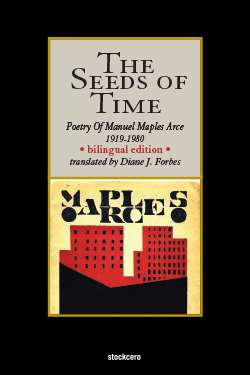The Seeds of Time: Poetry of Manuel Maples Arce, 1919-1980

Maples Arce, Manuel
 Bilingual - Spanish-English
Bilingual - Spanish-EnglishTranslation
Diane J. Forbes
ISBN: 978-1-949938-17-3
Library of Congress Control Number: 2022939259
Printed copy: U$ 42.56.- add to cart
Evaluation copy: U$ 27.66.- add to cart
Online access: U$ 9.99.- add to cart
Manuel Maples Arce’s 1920s avant-garde period is currently quite popular in Mexico, but his later poetry is largely unknown these days. Texts of his poetry were hard to find before the 1981 edition and 2013 reprint of his complete poetry, Las semillas del tiempo.
A few of his volumes have been translated into French: Poèmes Interdits by Edmond Vandercammen, and the three 1920s estridentista volumes as Stridentismeby Antoine Chareyre; one into English: Metropolis by John Dos Passos; and a few isolated 1920s poems here and there into English.
This bilingual edition, The Seeds of Time: Poetry of Manuel Maples Arce 1919-1980, translation and introduction by Diane J. Forbes, is the first English translation of Maples Arce’s complete poetry, providing both the original texts in Spanish and the translation into English, to introduce Maples Arce to the English-language readership and to present the texts to bilingual Hispanist scholars and students working outside of Mexico.
A major goal is to have readers consider Maples Arce’s complete poetry and not just his 1920s Estridentismo phase.
Forbes’ companion book Maneuvering Time and Place: the Poetry of Manuel Maples Arce(Stockcero, 2022, ISBN 978-1-949938-17-3) is the first book to analyze the complete poetry as a whole, explaining themes, style and trajectory.
Maples Arce is an important poet who deserves recognition as a major force in modern poetry.
Manuel Maples Arce was born May 1, 1900 in Papantla, Veracruz, Mexico, son of Manuel Maples (lawyer and poet) and Adela Arce. He spent his childhood in Tuxpan, Veracruz, where he attended the Escuela Cantonal Miguel Lerdo. He later attended the Preparatoria (after one year of study in Jalapa) in the city of Veracruz, followed by the Escuela Libre de Derecho in Mexico City, from which he received his law degree in 1925.
In 1930-31 he studied French literature and Art History at the Sorbonne in Paris. He began writing poetry as a teenager and published his first poem in 1919.
In his native state of Veracruz, Maples Arce held several judicial and political posts: Judge and Secretary General of the Government of the State of Veracruz (both in Jalapa and beginning in 1925), Interim Governor, and representative to the state legislature (1928). He was also consulting attorney for the State Departments of the Treasury and Government, technical consultant for the State Department of Education, and Head of the Editorial Department of same.
In 1932 Maples Arce was elected representative to the Federal Congress in Mexico City and in 1935 he joined the Mexican Foreign Service as Secretary of the Embassy in Belgium, where he was also Encargado de Negocios. In Warsaw and Rome he was Encargado de Negocios until the outbreak of World War II, when he was sent to London (with duties also in Lisbon) as Consul General and representative of Mexico to the governments in exile of Belgium, Czechoslovakia, Holland, Norway and Poland.
In 1944 he was appointed Ambassador to Panama, later to Chile (1950) and then Colombia (1951).
In 1952, Maples Arce was sent to renew diplomatic relations with Japan as the first Ambassador from Mexico to Japan, after which he was Ambassador in Canada (1956), Norway (1959), Lebanon and Pakistan (1962). Some of the diplomatic appointments stated here also included minor representation in other countries. For professional reasons and as a tourist, Maples traveled over most of the world.
Though an energetic and untiring representative of Mexico in the diplomatic corps and champion of Mexican cultural promotion, Maples Arce considered his main profession to be that of poet. He had an avid interest in literature from an early age, and wrote poetry from his teens to the year of his death. Poetry was his way of life and it, along with his appreciation of art, profoundly influenced his work as cultural ambassador.
Maples Arce was a contributing author to most of Mexico’s major periodicals, as well as to those of several foreign countries. Maples’ work has received critical commentary in numerous periodicals and other publications in Mexico and throughout the world, including countries where he served in the diplomatic corps and in the US.
Maples Arce married Blanche Vermeersch in Belgium on August 12, 1936, and they had two children, Manuel and Mireya. Upon retirement from the diplomatic corps in 1967, Maples returned to Mexico and continued to write poetry and essays, in addition to his three volumes of autobiography.
He died on June 26, 1981 in Mexico City.
Works by Manuel Maples Arce
Poetry:
- Andamios Interiores, México: Editorial Cultura, 1922.
- Urbe, México: Andrés Botas e Hijo, 1924.
- Poemas Interdictos, Jalapa, Veracruz: Ediciones de Horizonte, 1927.
- Memorial de la Sangre, México: Talleres Gráficos de la Nación, 1947.
- Las semillas del tiempo, México: Fondo de Cultura Económica, 1981.
Editorial/Criticism:
- Antología de la Poesía Mexicana Moderna, Rome: Poligráfica Tiberina, 1940.
- Siete cuentos mexicanos. Panamá: Biblioteca Selecta, 1946.
Essay:
- Modern Mexican Art (El Arte Mexicano Moderno). London: A. Zwemmer, 1943.
- El Paisaje en la Literatura Mexicana. México: Librería Porrúa Hnos. y Cía., 1944.
- Peregrinación por el Arte de México. Buenos Aires, 1951.
- Incitaciones y Valoraciones. México: Cuadernos Americanos, 1956.
- Ensayos Japoneses. México: Editorial Cultura, 1959.
- Leopoldo Méndez. México: Fondo de Cultura Económica, 1970.
Memoirs:
- A la orilla de este río.Madrid: Editorial Plenitud, 1964.
- Soberana juventud. Madrid: Editorial Plenitud, 1967.
- Mi vida por el mundo. Veracruz: Universidad Veracruzana, 1983.
Collaboration on many literary magazines, including:
- Zig-Zag, Revista de Revistas, El Universal Ilustrado, Irradiador, Horizonte.





